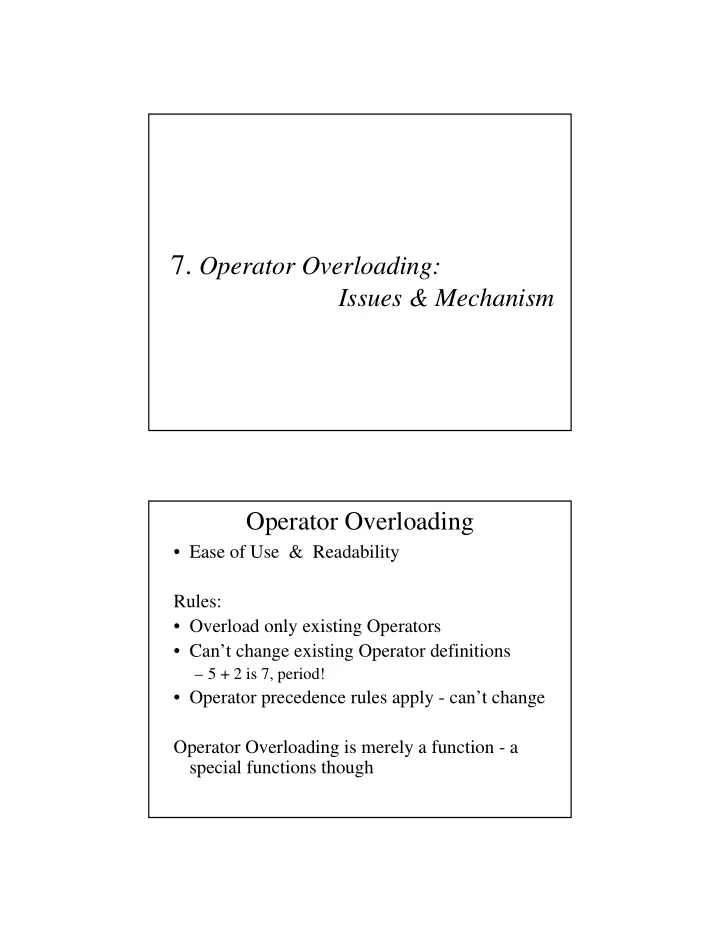

7. Operator Overloading: Issues & Mechanism Operator Overloading • Ease of Use & Readability Rules: • Overload only existing Operators • Can’t change existing Operator definitions – 5 + 2 is 7, period! • Operator precedence rules apply - can’t change Operator Overloading is merely a function - a special functions though
Examples using Complex class class Complex { double rep, imp; public: Complex (double rp=0, double ip=0) { set ( rp, ip ); } void set (double rp, double ip) { rep = rp; imp = ip; } void get(double& rp, double& ip) const { rp = rep; ip = imp; } ... }; Overloading the + Operator - as member function Adding two Complex numbers: C = A + B; // Operator+ as a member function of Complex class Complex Complex::operator+(const Complex& b) const { Complex temp; temp.rep = rep + b.rep; temp.imp = imp + b.imp; return temp; }
Overloading the + Operator - as global function // Operator+ as a non-member function of Complex class Complex operator+(const Complex& a, const Complex& b) { double realpartofa, realpartofb, impartofa, impartofb; a.get(realpartofa, impartofa); b.get(realpartofb, impartofb); Complex temp; temp.set(realpartofa+realpartofb, impartofa + impartofb); return temp; } Mechanism involved in resolving a call to Operator Overloading C = A + B; is equivalent to one of the following • C = A.operator+(B); – The operator + is associated with the left operand object. – Expects to see a member function operator+ in class Complex which takes an object of type Complex as argument • C = operator+(A, B); – The operator + is associated with neither object. – Expects to see a global function operator+ which takes two objects of type Complex as argument.
Exercise on operator+ • What are the possible ways to provide the following feature: A is a Complex number. C = A + 2.1; // Add 2.1 (double) to the // real part of A. Exercise on operator+ : Solution • Provide Complex operator+(double val) const; as a member function of Complex • Provide Complex operator+(const Complex& a, double val); as a global function • No need for any function if one of the following exists: • Complex Complex::operator+(const Complex&) const; • Complex operator+(const Complex&, const Complex&); Since Complex (double=0, double=0); can convert 2.1 to a Complex object
Another Exercise on operator+ • What are the possible ways to provide the following feature: A is a Complex number. C = 2.1 + A; // Add 2.1 (double) to the // real part of A. Another Exercise on operator+ : Solution • Recollect that 2.1 + A is equivalent to one of the following: – 2.1.operator+(A); – operator+(2.1, A); The first one is not possible since you can’t redefine + on double - built in datatype. Only option ( not considering type conversion ): provide Complex operator+(double val, const Complex& a);
Writing the operator+ for 2.1 + A Complex operator+(double val, const Complex& A) { double realpartofa, impartofa; a.get(realpartofa, impartofa); // Function call Overhead Complex temp; temp.set(val + realpartofa, impartofa); // Function call Overhead return temp; } Eliminating Overhead - that is what friends are for ?! class Complex { ... friend Complex operator+(double val, const Complex& a); } Complex operator+(double val, const Complex& A) { Complex temp; temp.rep = val + a.rep; // Direct access to A’s data, and temp’s temp.imp = a.imp; // Direct access to A’s data, and temp’s return temp; }
Should I write a member function or a global friend function? • Pure object-oriented languages allow only member functions. In C++ you may have a choice • Some functions should be members – operator= • Member do not introduce global names - use these in absence of other reasons • If implicit type conversion is desired, for all operands of an operation, use global functions. • If an operation modifies an operand, rather than merely returning a result, use member. Cascading Operators • D = A + B + C; – Where A, B and C are Complex • D = A + B + 2.1; • D = 2.1 + A + 3.2; All that it takes is a proper return type in the operator overloaded function.
Lab Work: Details provided on-line.
Recommend
More recommend